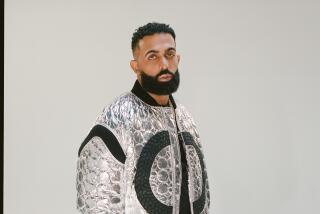Turkish-German Fusion Finds Expression in Rap
- Share via
BERLIN — He’s an edgy poet and a onetime crook.
He riffs in German. He rhymes in Turkish. Moving like liquid, he has the joints of a ghost. He’s a cross-cultural rapper in a Europe restless about identity. His hip-hop is a staccato barrage rumbling between two worlds, and the inherent contradictions, Ali Cinak will tell you, can be confusing when you’re a Muslim with a taste for sausage.
Cinak is one of a growing number of rappers distilling searing lyrics from the Turkish diaspora. Fleeing the poverty of their native land, their parents arrived in Germany as “guest workers” in the 1960s and ‘70s. They raised families and built parallel lives in a nation suspicious of outsiders. And today, their children remix Berlin and the Black Sea, spicing scratchy European percussion with the trill of Turkish stringed instruments.
“I live in one place, Germany,” says Cinak, 30, whose hip-hop nom de guerre is Azra. “But my life is a bit schizophrenic. Every now and then I eat currywurst. That’s pork. I couldn’t do that in Turkey. But when I visit Turkey, it’s a love affair, it’s like a bird who knows in a certain season where to fly. I look like everybody else.”
Germany’s 2 million Turks are the country’s largest minority. Theirs is not a tale of integration. Thousands of first- and second-generation Turks don’t speak German. When they die, their coffins are often shipped to ancestral graveyards scattered across the Turkish interior.
Third-generation Turkish Germans, such as Cinak’s younger hip-hop collaborator, Eko Fresh, feel a stronger attachment to Cologne than to Ankara but face limited opportunities -- 30% of Turkish Germans drop out of school, and 40% are jobless.
“I think my father was eaten up by living these two lives,” says Fuat Ergin, a rapper and the son of a seamstress and a tailor who migrated from Turkey’s Black Sea coast.
“He never integrated in Germany. He felt misplaced. I didn’t want this to eat me up too. I’m trying to be more of a universalist.”
The vernacular of Ergin and other Turkish rappers -- whose numbers in Berlin alone have risen from 10 to more than 40 over the last decade -- is insinuating itself into Germany’s street lexicon. Twined languages and cobbled images from disparate cultures are seeking to enliven and expand a tiny rap market, where the most successful hip-hop CD sold only 150,000 copies.
“The Turkish language is overloaded with pictures,” says Marcus Staiger, president of Royal Bunker Records, which released Cinak’s latest album. “The German tongue is more about details. The Turks are bringing color to the German language so that now German slang is losing prepositions. But language and culture can also be a problem. We’re having trouble reaching the Turkish audience in Germany. Their satellite dishes are pointed toward Turkey.”
The other day Cinak shuffled a bewildering mosaic of identities across his coffee table: a German passport, a pink card that grants him Turkish residency status, a white paper freeing him from the Turkish draft and two national ID cards. In some photos he has a mustache, in others a goatee. Over the years, he has become a chimera, a man of grafted allegiances.
“Germany is my country,” he insists.
Cinak’s parents emigrated from the Turkish city of Erzincan in 1970. His father found work as an electrician, and Cinak was born not far from the Berlin Wall in the Cold War days of 1974. The family moved to Kreuzberg, an immigrant ghetto where artists and grifters mingled with U.S. troops playing basketball with Turkish boys. Cinak was accepted at a school in a better, mostly German neighborhood but left after receiving poor grades in German language.
“The system told me I wasn’t good enough for that German school,” says Cinak, groggy from a night out and sitting beneath his two parrots in a cream-colored walk-up across the street from the Be-Bop Bar. “They told me to go back to Kreuzberg. This was wrong. My German was perfect.
“The kids in Kreuzberg weren’t into school. They were into crimes. I ended up with losers. I started forging checks when I was 14. My friends were violent gangsters. But I never hurt anyone. I was a brain gangster.”
Cinak fell in love and discovered that religious and tribal suspicions from the old country had been transplanted to the new. His girlfriend, Hilal, was Sunni Muslim. Cinak was a member of another sect, the Alawites. “She changed my life. I quit crime. I worked as a laborer. But her father was a man of ancient ideas,” Cinak says. “I tried to convince him. I said, ‘You are living in Germany 30 years -- let go of the old ways.’ He didn’t. I couldn’t marry her.”
He began penciling his troubles into rap songs. He wrote about lost love and was quickly chided by his buddies, who told him, “That’s not rap. What about LL Cool J?” Cinak said he didn’t want to glorify violence and gangsters. He chose instead things he knew: poverty, unemployment and discrimination. He’s become a kind of rapper sage, a young man whose streetwise lyrics caution Turks against crime and the anger over wondering where to belong.
“I am like you, a stranger in exile,” Cinak raps in “Turkish Boy,” a song on the new album by him and Eko. “I am from Turkey like you, have a German passport in my hand, a pink card in my pocket and my tail is at the front. Moodily malicious, I have puked blood. I have remained silent.”
The album cover shows a Turkish crescent moon bleeding into a German flag. Several songs deal with the politics of the two nations, including a riff on the marriage between a Turkish woman and the son of former Chancellor Helmut Kohl, and Turkey’s efforts to enter the European Union.
“Mr. Kohl is getting himself a daughter-in-law to Germany. The EU is closing its gates and the Turks have to stay outside,” goes the song “Burn Holes in My Jersey.” “It’s burning. I’m burning, I thought. But it wasn’t me, only my T-shirt.”
The album “talks about not only the problems of Turkish youths,” says Staiger, who co-produced the CD.
“It’s universal. It’s an album about everyday problems with an emphasis on people who look different.”
Turkish Germans “haven’t yet established a real mixed immigration culture,” he says. “You can see it in Cinak, who is 30, and in Eko, who is 20. A lot changed in the 10 years separating them. Cinak still wants a Turkish wife. He can’t imagine marrying a German. But Eko doesn’t think about such things. His generation’s more assimilated.”
Eko calls himself “The German Dream.” Still, he and Cinak will be lucky to sell 20,000 to 30,000 copies of their CD. There are problems with exposure. Eko’s German lyrics are marketable, but when laced with Cinak’s Turkish lines, the songs become a liability in reaching a wider German audience. And Staiger’s Royal Bunker label is involved in a lawsuit after claiming a radio station was racist for refusing to play Turkish rap.
Sitting beneath a picture of Kemal Ataturk, the father of modern Turkey, Fuat Ergin says he’s troubled by how he’s perceived by many Germans. There’s a glitch, a gap, says the popular hip-hop songwriter, something that divides, even with his tidy German and his reverence for Europe.
“When I go to east Berlin carrying my grocery bag, they look at me like I’m a hijacker who flew a plane into the World Trade Center,” says Ergin, 32. “I’m so tired of this discrimination. It’s in the media. It’s everywhere.”
His 1999 album, “Hassickdir?” -- which, translated into Berlin slang, means ‘Do I hate you?” -- featured a gun on the cover. The hip-hop world has not brought riches -- he pays his bills working as a courier for a doctor’s office. He can’t afford an apartment, lives with family and friends and hauls his CDs around in a bag.
He doesn’t want to be marketed. He wants to be understood. Some people, he says, think he’s a prophet.
Ergin visits Turkey and often feels the passion that his father, who never succumbed to the charms of Europe, experienced in his native Black Sea town of Sile. But his is a new life -- split and spliced, yet he’s confident in who he is.
“I’m a Turk living in Europe,” he says. “I know my language, culture and past. But I need to know the German language for integration. You can put anything under the rap roof. My lyrics are chaotic. They reflect my life. I started writing hip-hop songs in English. But I didn’t dream in English. I tried writing in German, too, but I didn’t know German literature. I switched to writing in Turkish one night, and it was like something exploded and the language flowed.”
He knows much of the generation after him does not speak Turkish. Village names and folklore from the old country are still whispered by grandparents, but they have little resonance for the young, whose cross-cultural meandering is played out in the ephemeral buzz and flutter of cyberspace. Sunlight and the sound of traffic drift through Ergin’s window.
“I like going to Turkey,” he says. “I spent 55 days there in 2000 and in 2002. But I missed Germany, and when I returned, I was happy to see buses running on time.”
More to Read
Sign up for Essential California
The most important California stories and recommendations in your inbox every morning.
You may occasionally receive promotional content from the Los Angeles Times.














